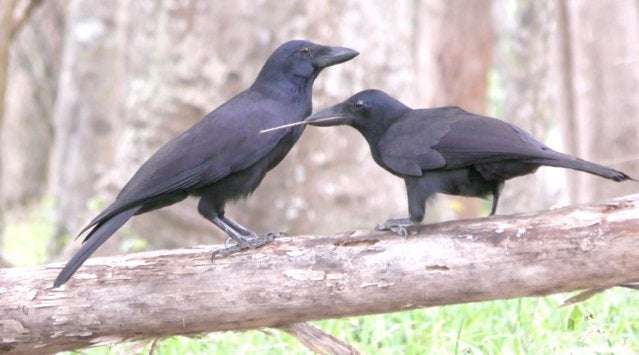Source: Corvus Moneduloides, via Flickr. Distributed under a CC BY-NC-SA 2.0 license.
With Thanksgiving and the holiday season upon us, it’s the perfect time to talk about .
One measure of self-control is the ability to delay gratification; namely, the ability to wait in order to obtain a more valuable outcome in the future over a less valuable immediate one. In children, the capacity to delay gratification develops between the ages of three and five years old. In many animals, delaying gratification can be useful in social or foraging situations, like inhibiting one’s approach to food or mates in the presence of a competitor. Delay of gratification can be observed in animals that make and use tools, such as New Caledonian crows that use tools to obtain out-of-reach snacks rather than just eating immediately available food.
There are lots of different ways to study delay of gratification (you may have heard of the marshmallow test with kids). In a new study, researchers used a rotating tray apparatus that allowed them to test both three- to five-year-old children and New Caledonian crows. In this paradigm, two rewards are presented on a rotating tray, one of which can be reached by the subject immediately and the other which can be reached following a short delay. The researchers made it interesting by manipulating the rewards to vary in quantity or quality as well as visibility.
Rachael Miller, a psychologist at the University of Cambridge and one of the study’s authors, says the methodology wasn’t identical between species.
“Experiments with young children have to be framed as fun games that we play with them, so they don’t get bored or lose focus,” says Miller. While sparkly animal stickers provided the children with , the crows’ rewards were food treats like worms or nuts.
“We need to give the birds a bit more training, as we can’t verbally explain to them what they have to do,” says Miller. “This is also one of the reasons for choosing the rotating tray paradigm—it is very intuitive because the subjects can see the rewards move towards them and, therefore, it doesn’t require very much training before testing.”
Though the differences in methodology make it difficult to directly compare kids and crows, both species succeeded in waiting for a delayed reward when it was of better quantity or quality than an immediate reward. Children and crows were more likely to wait for the delayed reward when the two rewards differed in quality (for instance, one piece of apple versus one piece of meat) than when they differed in quantity (for instance, one piece of meat versus four pieces of meat).
With regard to visibility, children showed no difference in performance when either of the rewards was hidden. Crows, however, performed better when the immediate reward was visible than when the delayed reward was visible.
Anna Frohnwieser, Miller’s colleague and co-author, believes they know why the birds struggled with this task.
“This finding is likely due to the children observing the experimenter while the rewards were placed on the tray and remembering where each reward was located, while the crows (which are wild-caught animals) kept their distance from the experimenter and may have relied on inference by exclusion to make the right choice,” says Frohnwieser.
The results suggest that tests of delayed gratification aren’t so simple. Performance may be influenced by the choices presented during testing. It’s an important reminder that many factors can influence self-control, both for future laboratory tests as well as in real life.
If kids and crows can wait for a better reward, maybe we can all try to show some self-control in the face of all those upcoming holiday feasts.

JessicasDreaming on November 23rd, 2019 at 13:18 UTC »
Crows are pretty cool. They have funerals for their dead also
Bladeteacher on November 23rd, 2019 at 12:44 UTC »
Favorite animal since forever. They can talk,they can even talk back! They are really smart,actually kinda caring ,they form real bonds like parrots. Super smart,very self dependant,kinda assholes too(i love it)! My dream is to have one as a companion. I dont want to own it,I want it to be my friend and hang out around my house .
TheGreat_War_Machine on November 23rd, 2019 at 12:36 UTC »
Crows in general are so fascinating. They present much of the same qualities that we have like long-term memory and playfulness.
Offspring will even vist their parents nest from time to time and take care of new offspring as adults.
They also crack nuts open by placing them on an intersection and waiting for a car to run over it.
They also have developed symbiotic relationships with predatory animals like wolves. In one example, a crow will guide them to a fresh corpse that they can eat. Once the wolves are done, they can pick up whatever is left.